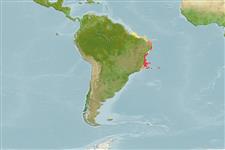分类 / Names
俗名 | 同种异名 | Catalog of Fishes(属, 种) | ITIS | CoL | WoRMS | Cloffa
Teleostei >
Eupercaria/misc (Various families in series Eupercaria)
鱸形目 (Various families in series Eupercaria) >
Labridae (Wrasses)
隆頭魚科 (Wrasses) > Corinae
Etymology: Halichoeres: Greek, als, alis = salt + Greek, choiros = pig (Ref. 45335); rubrovirens: Name from Latin which means red and green; referring to the distinctive red and green color pattern of the adults..
Environment: milieu / climate zone / depth range / distribution range
生态学
海洋 礁区鱼类; 深度上下限 6 - 25 m (Ref. 83981).
Southwest Atlantic: endemic to the Trindade and Martin Vaz Island group, located 1200 km east of the southeastern Brazilian coast.
大小 / 重量 / 年龄
Maturity: Lm ? range ? - ? cm
Max length : 23.1 cm SL 雄鱼/尚未辨别雌雄; (Ref. 83981)
Little is known about the ecology for this species, however, juveniles seem to mimic and usually swim together with schools of Thalassoma noronhanum which they resemble in color. Specimens were observed over high rugosity rocky bottoms with calcareous algae at depths (Ref. 83981).
Life cycle and mating behavior
Maturities | 繁殖 | Spawnings | Egg(s) | Fecundities | 仔鱼
Distinct pairing during breeding (Ref. 205).
Rocha, L.A., H.T. Pinheiro and J.L. Gasparini, 2010. Description of Halichoeres rubrovirens, a new species of wrasse (labridae: perciformes) from the Trinidade and Martin Vaz Island group, southeastern Brazil, with a preliminary mtDNA molecular phylogeny of the New World Halichores. Zootaxa 2422:22-30. (Ref. 83981)
人类利用
工具
特别资料
下载 XML
网络资源
Estimates based on models
Preferred temperature (Ref.
123201): 25.8 - 27.6, mean 27.4 °C (based on 113 cells).
Phylogenetic diversity index (Ref.
82804): PD
50 = 0.5000 [Uniqueness, from 0.5 = low to 2.0 = high].
Bayesian length-weight: a=0.00646 (0.00321 - 0.01300), b=3.12 (2.93 - 3.31), in cm total length, based on LWR estimates for this species & (Sub)family-body (Ref.
93245).
营养阶层 (Ref.
69278): 3.6 ±0.5 se; based on size and trophs of closest relatives
回复力 (Ref.
120179): 中等的, 族群倍增时间最少 1.4 - 4.4年 (Preliminary K or Fecundity.).
Fishing Vulnerability (Ref.
59153): Low vulnerability (18 of 100).
